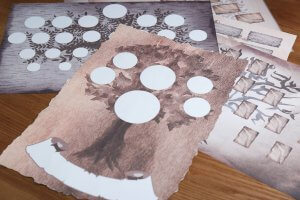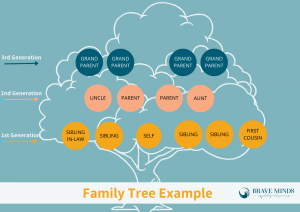In the first part of this series, we looked at the 4 Reasons Why Understanding More About You and Your Partner’s Families Can Improve Your Present Relationship. If you haven’t had a chance to read that yet, start there before moving on to this exercise. Here you and your partner will walk through an exercise of drawing a family tree. You should each draw your own families from childhood on separate sheets of paper. This activity can be a lot of fun to do together! It also helps you visually see patterns you may have not seen before. Couples counseling is often mistakenly thought of as a last resort for partners, or as a solution to issues. However, couples counseling can be a form of preventative care to continue the growth and love of healthy relationships.
How To Draw Your Family Tree
As we discussed in part one, there are some patterns in families that get passed down from generation to generation. Identifying these patterns can help you, and your partner, decide which of these patterns you want to continue together and which ones you do not. It is helpful to draw your family tree with more than one generation represented if you are able to. Starting with yourself, add branches for siblings, parents, grandparents, cousins, and so forth. It should look something like this:
You can print a blank copy of this template.
Helpful Discussion Questions
Once you have everyone drawn you can start to engage in some of the questions below with your partner to reveal more about your family tree.
- What is the history of divorce/separation in your family?
- What did family conflict look like?
- How did you show someone you loved them/ how did you know you were loved?
- What are fond memories of your childhood you’re reminded of in your life now?
- Did you have a specific role in the family (formal or informal)?
- What were some of the family rules? Explicit rules? Implicit rules?
- Are there parts of your parent’s marriage you would not want to repeat? Why?
- Are there relationships in your family that you would want to emulate? Why?
- Were there specific rules, roles, or expectations related to gender?
- What role did religion play in your family?
- What role did race and ethnic background play in your family, childhood experiences, and perspectives on others?
- Who in your family are you most like?
- What were your family values/ traditions/ beliefs growing up?
- Are there health/ mental health/ substance issues in your family tree?
Make notes or symbols on your tree as you and your partner answer these questions. For instance, you can note the ages of everyone on your tree. You can also draw a symbol like a star next to couples in the family that are divorced if there are any. Draw a new symbol like a circle next to anyone in the family tree that you know has been to therapy before. Take creative license with your symbols and notes while keeping in mind you are seeking out patterns of relationships, communication, and coping mechanisms within your childhood family tree.
Why Do This Exercise?

Talking about your childhood family can stir up a lot of feelings and memories. Depending on your childhood home, these memories may be difficult as they resurface. Those pain points will be powerful to share with your partner, though they may also show you areas that need healing. This may prompt you to reflect on work you may want to do in individual therapy.
Put Your Learning Into Practice
So how does this exercise pave the path forward for you and your partner? Revealing patterns within both of your childhood families will tell you more about yourselves today. This can include your communication style, patterns of behavior, feelings of self-esteem, and coping mechanisms.
For example, in some families, substance abuse may be common among family members and across generations. Growing up in a family where substance abuse was prevalent may have predisposed you to cope with substance use. Alternatively, it may have predisposed you to feeling both familiar with and triggered by chaotic environments (which frequently come with substance abuse). It may highlight themes you and your partner have already discussed in your relationship. It can also make you and your partner more self-aware of how to support each other through times of stress in a healthy way.
Getting Professional Support
Marriage and family therapists work with clients to make changes based on the environment they live within and the environment they grew up in. This includes your family, your co-parent or your romantic partner, and even your community. These are the systems and experiences in your life that have shaped you. However, you are a piece of that system and therefore have the ability to shape others around you too. This is the beauty of couples counseling or family therapy.
Begin Couples Therapy in Scotch Plains or Branchburg, NJ

- Contact Brave Minds Psychological Services
- Meet with a caring therapist
- Start improving your relationship
Other Services Offered at Brave Minds Psychological Services
Couples Therapy isn’t the only service provided at our NJ-based therapy practices. Other services offered include parenting counseling, counseling for teens, online therapy, trauma therapy, anxiety treatment for children, child sexual abuse therapy, anxiety treatment for teens. We also offer teen social phobia therapy, adult anxiety counseling, counseling for parents, postpartum counseling, birth trauma therapy, sexual assault counseling for adults, and food allergy therapy.




